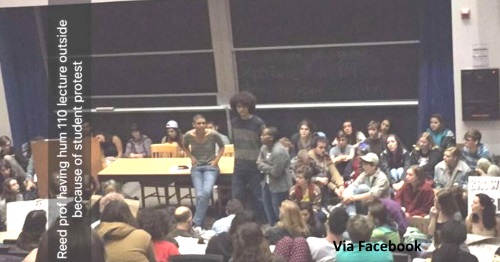
At Reed College, a mandatory freshman literature course focused on the works of great thinkers underpinning Western Civilization has come under fire from campus activists, who allege the mandate is systemically racist because the class only assigns the works of white authors and therefore perpetuates white privilege and racism.
The target is Humanities 110, “Greece and the Ancient Mediterranean,” an introduction to the works of celebrated Greco-Roman thinkers such as Aristotle, Plato, Epictetus and Ovid.
Humanities 110, which has evolved over the years, has been a required course at the private, Portland, Ore.-based liberal arts college for decades, but a group of students calling themselves Reedies Against Racism want the curriculum changed.
In their words, it must be “reformed to represent the voices of people of color.”
Last fall they launched frequent protests against the class — an effort that continued through spring semester and prompted scholars to now consider revising the course.
 During many of the lecture sessions of Hum 110 throughout the school year, while professors spoke on “The Rise of Rome” or “On the Nature of Things,” protesters sat or stood in the lecture hall holding up signs that read “I am more than a way to get federal funding” or “We cannot be erased.”
During many of the lecture sessions of Hum 110 throughout the school year, while professors spoke on “The Rise of Rome” or “On the Nature of Things,” protesters sat or stood in the lecture hall holding up signs that read “I am more than a way to get federal funding” or “We cannot be erased.”
Some even wore tape across their mouths to signify that “Greece and the Ancient Mediterranean” is silencing them by only teaching white authors. Some professors asked the students not to crash their lecture halls, but those pleas were ignored.
The protests prompted scholars to move up the course’s review to this year. The results of that review, and any possible changes to the Humanities 110 syllabus as a result, may be announced this summer, a campus spokesman told The College Fix.
“The current humanities course focuses on the Classical world in its ancient Mediterranean context; this has not always been the case and the faculty differ on how important they think this focus is to the course,” Reed spokesman Kevin Myers said via email, noting faculty make all curricular decisions.
“Among other questions, the review will consider the focus for the next iteration of the course. Regardless of its content, the main emphasis of the humanities course is for students to develop the skills that will help them succeed in their classes at Reed and their lives after graduation,” Myers stated.
Western Civ on trial
Despite the criticisms from the vocal minority, many Reed students have appreciated the course as is.
It aims “to understand the philosophical underpinnings of Western society, and goes a long way towards giving students the context to think through the great problems of government and society themselves,” senior economics major Zachary Harding, who has taken the course, told The College Fix.
Another former student of the class, 2016 Reed College alumnus Aristomenes Spanos, agreed. “There is value in learning the different methods people used to tackle the same problems we deal with today,” Spanos told The Fix.
But other students say they see the class as a systemically racist course that perpetuates white privilege and racism and works to silence people of color.
Reed College student Addison Bates, who is among those leading the charge against the course, has said she is motivated by the school’s low black student population and low black graduation rate.
She spoke with other black students about her concerns, and they shared experiences of feeling unsupported at Reed, and feeling used by Reed just to increase its diversity statistics, Bates told The College Fix in a telephone interview.
Ultimately Humanities 110 became a major object of their critique. To Bates and her friends, it exemplifies Reed’s failure to seriously commit to diversity, arguing that Reed mandates all students take a course where everyone reads white authors.
Inspired by Isaiah Washington’s call last September for African Americans to boycott the United States, Bates and her friends began an almost daily protest against Humanities 110, an effort that launched last fall and continued through the spring semester.
Reedies Against Racism is another iteration of a nationwide movement among student activists calling for greater ethnic and racial diversity on college campuses, and for special accommodations for students of color.
The group’s 25 demands, which can be found on their website, include a staff-maintained Black Student Union, and more black counselors at the Reed health center. When it comes to Humanities 110, they declare it should be “reformed to represent the voices of people of color.”
“Lecturers should structure delivery and analysis of content that is sensitive to and proactive for inclusive practices. There should be an articulated understanding that ‘foundational texts’ are subjective and that the importance of the course is to foster student’s abilities to read, write, and listen/respond,” the demand continues. “Before this is accomplished, Hum 110 should be conscious of the power it gives to already privileged ideas and welcome critique of that use of power. This could be done by 1) allowing alternative readings that critique texts on the current syllabus, 2) making Hum 110 non-mandatory until reform happens or 3) alternate options for Hum lecture.”
Bates told The College Fix that Reedies Against Racism want texts from outside the “Caucasoid” region.
But not all students agree with a model of higher education in which syllabi attempt to represent a diversity of identity groups.
“I don’t think it is important to try to segment the curriculum of Hum 110 by identity. I think the curriculum is meant to represent an historically important segment of texts,” Harding said.
Faculty under siege
More fundamentally, some are critical of the very notion that diversity based on identity groups can be used to to guide syllabi decisions.
Professor Jordan Peterson, a University of Toronto psychologist, told The College Fix with reference to activists like Reedies Against Racism: “Their claim for diversity is untenable because groups can be fractionated down to the level of the individual.”
Other students are concerned about Reedies Against Racism method of protesting.
D.K., a junior studying political sciences, told The Fix: “The way they are going about this is very juvenile and they have alienated a lot of faculty by refusing to take criticism from moderate faculty. What’s that led to is a lot of rationalization for not doing work – class-work – and hard work. As much as I hate the right-wing anti-coddling discourse, there is some truth in it, and this protest doesn’t at all help.”
Last October, Russian Literature professor Marat Grinberg became the first professor to ask Reedies Against Racism not to protest during a lecture.
While Grinberg declined to be interviewed, Bates explains that Grinberg felt “that the classroom isn’t the proper place for dissent.”
Nevertheless, Bates said, “We went full force that day he [Grinberg] had his lecture, because we wanted to make sure that if a professor said not to represent our opinion, we were going to represent our opinion.”
Reedies Against Racism galvanized so much support that day that they took over the lecture hall. Grinberg, unable to deliver his lecture, went outside to speak to the students willing to follow him.
Another incident came in early November when English Literature professor Lucia Martinez emailed Reedies Against Racism saying that she would be pained by any protesting during her lecture.
In an open letter to Martinez, Reedies Against Racism organizers replied: “Saying that any form of protest would trigger your trauma ignores the traumas of students protesting whose mental health is deteriorating right at this moment… You are also someone who has been anti-black.” The protest continued during Martinez’s lecture (protesters sat in the audience wearing all black).
In Reedies Against Racism’s open letter to Martinez, the group also wrote: “We would also like to remind white students that when it comes to how black and brown people educate and communicate with one another, you do not get to have an opinion…You are voyeurs at best.”
When a student did in fact ask for justification on Facebook for the claim that Martinez was “anti-black,” RAR supporters and organizers responded by rejecting the question due to his perceived race.
“It’s not really students of color’s responsibility to explain their trauma to you… You should consider trusting the word of students of color.” Another added, “For everyone who wants dialogue – some dialogues are not for you to have or be a part of.”
MORE: Stanford erupts in controversy after student petition calls for mandatory Western Civ classes
Like The College Fix on Facebook / Follow us on Twitter




Please join the conversation about our stories on Facebook, Twitter, Instagram, Reddit, MeWe, Rumble, Gab, Minds and Gettr.